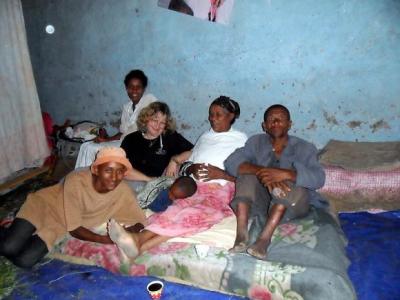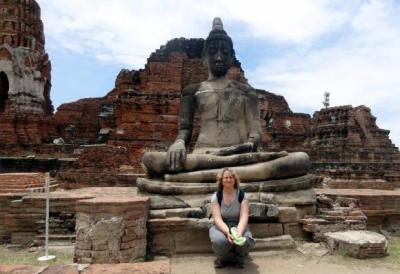Obsession Story: Elizabeth Weiser and close-to-the-ground travel

For this series, we reach out to a member of the department who has a very particular obsession and ask them to share it with the world. In this edition, Professor Elizabeth Weiser guides us through her travels across 30+ countries and six continents.
I love to travel. I don’t mean family trips to the beach or Disney World. I mean I loved the day I wandered lost through Addis Ababa, looking for the Haile Selassie cathedral, realizing I had no ability at all to read the Amharic signs (all of which were no doubt saying “This way to the cathedral!”) until two students came up to me in the street to practice their English. Ah, of course I would want to go to the cathedral today, they said. They cheerfully led me to an outdoor plaza jammed with thousands of pilgrims. “Come along!” They threaded me through the throng until we reached the front, ignoring my embarrassed “no, really, I don’t…” Nearly all the women were in pure white on the one day I had decided to wear all black. “Look!” they pointed to an umbrella-covered platform. “There is the Ark of the Covenant!” I—what? Pilgrims moved aside from the ceremony they’d waited for outside, fasting, all night so I could see and hear better the Amharic-speaking priests. Someone took my camera to take photos for me. Everyone smiled. All I had been wanting, I told no one there, was a photo of Selassie’s tomb for my brother-in-law who was kind of into reggae. . . . What I got was so very much more. And that’s what I mean by travel.
Growing up, we never went anywhere. We lived in Minnesota, but we didn’t camp. Chicago, the big city, was an eight-hour drive to the east. I was 19 before I ever got there, my one memory the realization that famous paintings in photographs could be seen live. “Two Sisters on the Terrace”—I will never forget your brushstrokes on that red hat, Pierre-Auguste Renoir.

Fast forward through my first trips abroad, a college tour of Ireland (castles, flirting, drinking—typical liturgical choir), followed by a semester in Cuernavaca, Mexico, where my host family had no running water and I had (at first) the Spanish of a five-year old. I thought I’d had the experience of a lifetime…and then I tagged along to Guatemala for the summer, landing in the middle of a genocidal war the world did not yet know about in those pre-internet days. I played games in the orphanage with children who’d witnessed their families burned to death. I held babies as they died from malnutrition. I lived with nuns and fell in love with a man wanted by the paramilitaries. Firefights rang through the mountains all around us; people were tortured in the church’s guesthouse. It was the single most beautiful place on the planet. I learned that life was precarious—and so, so precious—and I came back a different person.
But fast forward another ten years, because that different person went to work in Washington, DC, where the world came to me. Only at 30 did my best friend and I quit our save-the-world jobs to spend four months backpacking through Europe, Greece to Ireland. Rick Steves was our Beatrice, we his devoted acolytes. We got a crash course in Western Civilization, but most of all I realized the joy of walking lightly in the world, relying on two pants, five shirts, hiking boots, a clothes line and phrase books (“hello, please, thank you” in every language—my passport to the world).
Fast forward through some years of backpacking peregrination and a few more degrees, and my new husband and I found ourselves teaching for a year in Ankara, Turkey, where even grocery shopping was at first a major adventure and a trip out of town the mental equivalent of D-Day preparations. Seeing the rest of the world through Turkish eyes was very much like speaking Turkish—subjects, verbs, objects all present but all in surprising places. Through the Looking Glass into a world that, şükür, included the most radically hospitable people I have ever met. Our first visit to the nearby mosque—“was I doing it right?”—and a young religious leader came immediately over to us, breaking into a wide smile I can still see today. Hoş geldiniz, he greeted us, the regular phrase of welcome which translates literally to pleasant you came. And praise the phrase book, we knew the proper response, hoş bulduk, pleasant we found it. Very, very pleasant indeed.

Thus, when the opportunity arose to travel the world alone as an English scholar (“of course this is what we do,” I tell the students), I didn’t hesitate. I’ve now spent time in over 30 countries on six continents (with plans for Antarctica), studying nationalism in cultural heritage. I’ve discussed why tradition matters with old gauchos in Argentina, why China is ‘too individualistic’ to win the World Cup, why national identity is so resonant to Rwandans and Uzbeks, what the New Kiwi means for New Zealand and why Romans still covet the ancient empire (“after caput mundi, what is left?”). I’ve also bargained and chatted in markets from Tashkent to Tunis to Tlaquepaque, seen dingoes sniff around my bedroll in the Outback, biked through gorgeous temple grounds at night in Bangkok, been so sick I thought I’d die in Cusco (thank you coca tea), walked through Tahrir Square during the Arab Spring at 5:00am (“may we paint the flag on your hand?”), and safaried in an old Mazda (“should we be that close to that rhino?”). I have been moved by calls to prayer and church bells and prayer bells and chants. I’ve sung the Ganga Aarti in Rishikesh and Evensong in Leicester and my own praise songs to the Earth Mother in all her manifestations from the Aran Islands to Norköpping, Sweden, to Ayutthaya, Thailand. I’ve ridden in jumbo jets, rickshaws, tuk-tuks, ferries, on elephants and camels and motorcyles, in funiculars, cable cars and way too many prop planes. I have been lost and lonely and sick and robbed multiple times, and because of that I have met an endless string of helpful and fascinating people. It is because of my own vulnerability that I am buoyed continually by the kindness of strangers.
The Indian poet Rabindranath Tagore, whose Gitanjali I read obsessively in Kolkata, wrote that “the traveler has to knock at every alien door to come to his own.” Traveling alone can be terrifying to contemplate from our living room, where we feel safe and in control, because we must throw ourselves on the mercy of the world. But, usually, the world is a sublimely friendly place filled with people who dream as we do. Travel too comfortably and these sublime people become simply the servants whisking you to the next sight; travel with a companion and these sublime people become mere background to your shared life. Travel alone, close to the ground, and you knock on your own door. You are forced to enter as a minor character into the world’s story, on its terms, ready to be cracked open by its endless surprising bounty.
